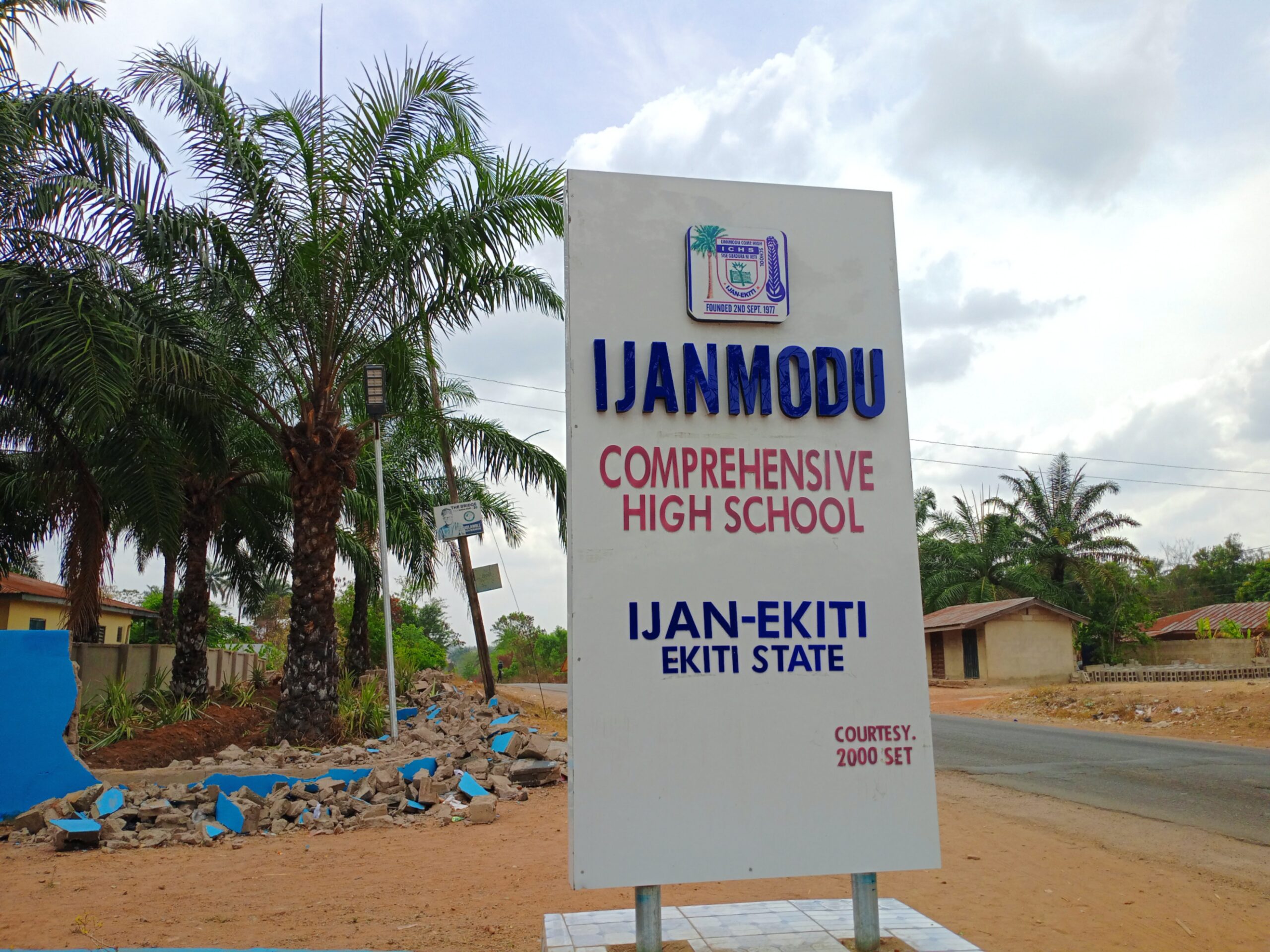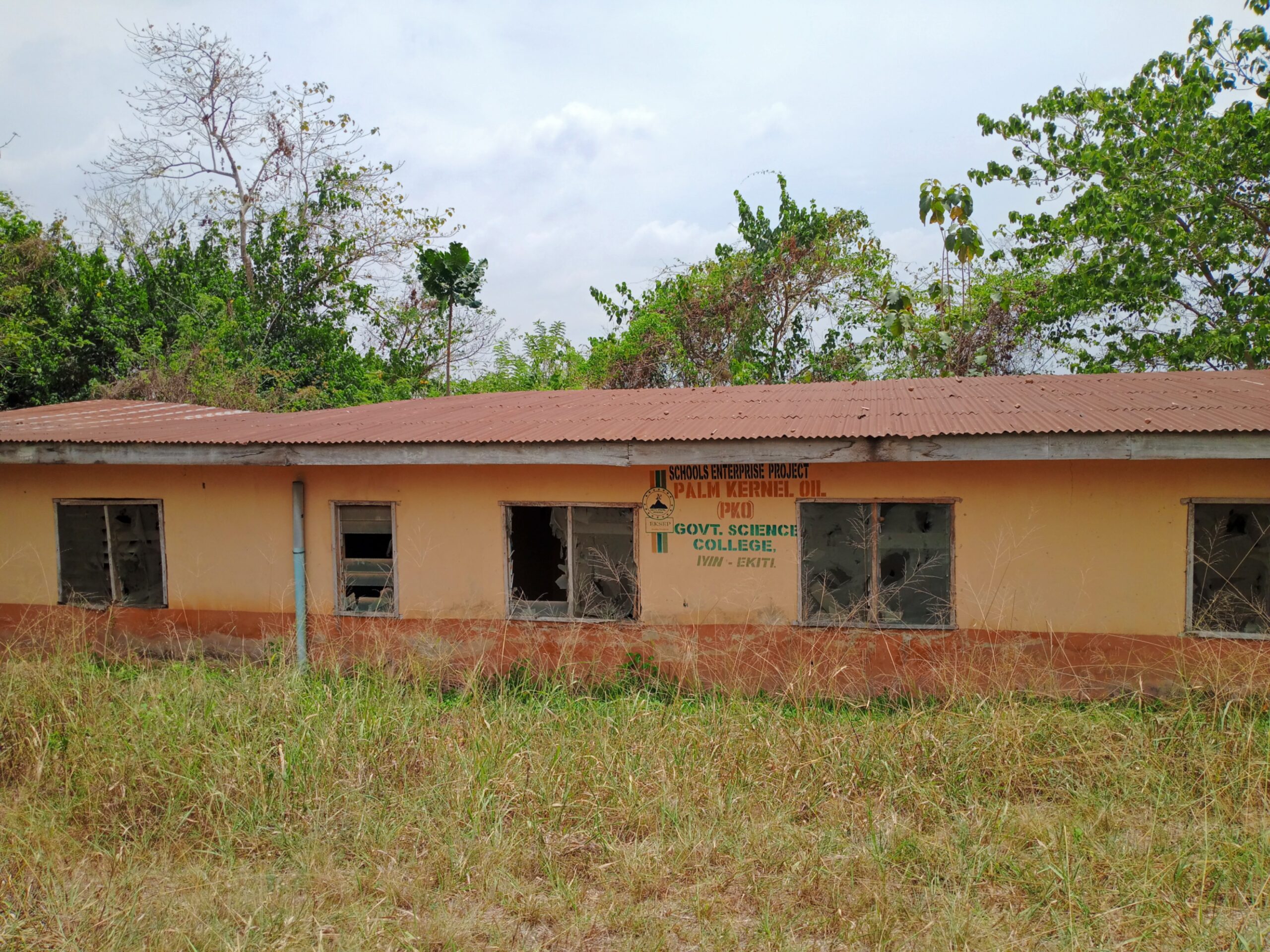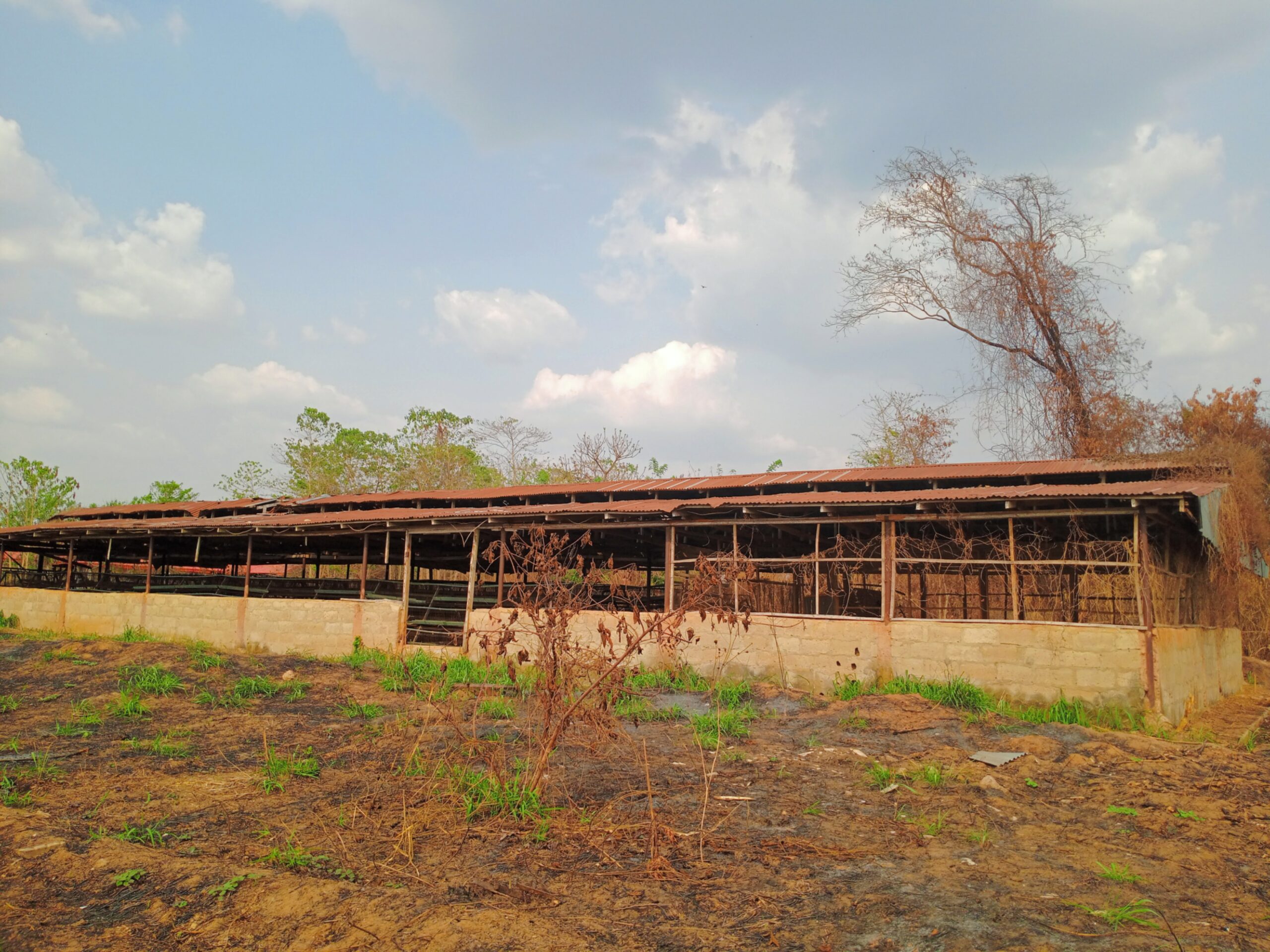A tale of malfeasance and decay unfolds within a government-founded agency in Ekiti State, visibly manifested in abandoned poultry farms, decrepit industrial equipment, and decaying processing plants. Despite the millions of naira frittered away on these projects, the climate of rot eclipsed the promise of an industrialized future for local communities.
The 2020 audit report of Ekiti State unravelled the gross failure of the Ekiti State Schools’ Agriculture and Enterprises Agency, established by the Segun Oni administration to equip students with industrial skills while also generating revenue for the state. The audit report, however, revealed that most of the projects initiated by the agency remain in shambles.
In 2017, after an inspection tour of the projects between June 20 and 23, a team of auditors from the Ekiti Auditor General’s office found that the majority of the projects executed in select boarding schools in the state hardly met their purpose.
This February, this reporter visited five of these projects to ascertain their current status, as detailed below:
Government College Oye-Ekiti Poultry
Teachers were seen preparing their curriculum for the resumption of lessons following a mid-term break. Among a group of teachers seated under a canopy was Mr. Adebayo Philip, a senior staff member.
“The poultry was once operated by someone who leased the facility, but since he left, nothing has happened,” he said of the government-sponsored poultry.
The audit report stated that the school managed the Oye poultry well, although the reality didn’t match the glowing remarks. On a tour of the poultry, this reporter found a delapidated poultry. Where chickens should be incubating, grasses grew wildly from beneath a shattered ceiling.
“Oye Poultry was leased to Blue Pond Farms in August 2012 and terminated in 2016 at N360,000.00 per year. He (the former poultry farmer) left in 2015 and paid only N100,000.00 in May 2014, leaving a balance of N980,000.00,” the audit report read.
Although registered with the Corporate Affairs Commission (CAC) on May 25, 2009, Blue Pond Farms is now marked INACTIVE on the CAC website. A registered company whose annual returns is not kept up to date on the CAC portal is declared ‘INACTIVE.’
Methodist Girl’s Ifaki Nylon-Processing Company
The audit report states, “Nylon processing machines were supplied to the site by Astec Nig. Ltd. at a cost of N2,500,000.00. The equipment was left in the rain outside the factory site, un-installed since 2008 and full payments had been made to the Engineer/Contractor.”
The facility couldn’t be found within the premises of the Methodist Girls School upon inspection. However, the school’s security guard, who identified himself as Mr. Ade Olarinde, guided this reporter to the plant, which stood between the Mothodist school and an annex of the Federal University, Oye-Ekiti (FUOYE).
As Olarinde explained, the project was initiated during the Segun Oni administration. After the end of his tenure, it was expected that the following administration, led by Governor Fayemi, would take over the project. But the factory has remained neglected since then.
In addition to generating income for the state, the industrial plant was intended to benefit the immediate community of Ifaki.
“Inside the building, there are several rotten machines in it for the production of different nylons. I could clearly remember that there was a standby generator and other sophisticated machines that were brought here, but sixteen years later, it is still decaying there,” Olarinde described the facility.
A man who appeared to be a spiritualist, followed closely by a naked man, appeared around the corner of the university annex. “The girl’s school owns it, but it has been abandoned. The machines are wasted already,” he said.
A vast array of corroded machines intended to produce polythene bags were piled in the yard. Despite remaining untouched by production, the factory building appears dilapidated, against a background of peeling paint and cracking walls.
A check of Astec Nigeria Limited on the CAC portal, NG-Check.com, and Nigeria24 in April did not provide any results.
Ijanmodu Comprehensive High School
At the center of this saga is the Ijanmodu Comprehensive High School, where dreams of a flourishing cassava processing plant have withered away. Initial enthusiasm turned to disappointment as the machinery, supplied by Techo Quip Ltd., failed to live up to expectations. Despite full payment, the ‘Blower’ malfunctioned during test runs, condemning the factory to perpetual inactivity. Local voices echo the same sentiment – promises unfulfilled, potential squandered.
Alao David, a teacher at the senior secondary school, recounted brief periods of manual operation before the factory ground to a halt, leaving hopes dashed and futures uncertain. “The engines didn’t work at all, but, manually, we worked for a while in the factory. The manual processing time was only for a few months. We had a collaboration with the indigenes who worked on the cassava,” he said.

For months, the school indulged the indigenes, who could produce cassava flakes traditionally, using firewood to fry the ground cassava into consumable Garri. The community and school anticipated the full operation of the processing machines, but eventually, the factory shut down after months of manual operation.
One of the security guards who witnessed the machine’s test run corroborated the audit report. He narrated how the blower stopped working after producing a deafening sound when the contractor’s team was trying to assemble and prepare it for the production course.
In March, a review of the contracted company, Techo Quip Ltd., on NG-Check.com revealed that it was incorporated in 1991, in Ikotun, Lagos. Search results from the CAC labeled the company as struck-off, a term used to describe the procedure of delisting a company’s name from the register maintained by the Registrar of Companies (ROC). This action results in the company losing its legal recognition as a distinct entity and effectively ceasing to exist.
However, the company had a phone number listed on its Facebook page. In a telephone conversation on a call to the displayed phone number, a man told this reporter, “I don’t know. There has never been a report concerning that. Is there a report like that? Before it was approved and our balance was paid, it must have been installed.”
He recalled how the project was implemented over a decade ago, but that he was sure of the perfection of the operation before receiving full payment, in contrast with the audit report which confirmed full payment despite the imperfection.
Truecaller confirmed the identity of the speaker as Oyekanmi Fajimi, who is the general manager of the company. LinkedIn confirmed this.
Government Science College, Iyin-Ekiti
A similar fate befalls the palm kernel oil factory at Government Science College, Iyin. Overgrown with neglect, the once-promising venture now lies dormant, a monument to failed ambitions.
According to the Audit Report, “The Machine supplied to the site by Techo Quip Ltd at the cost of N2,717,550.00 is a sub-standard one. It was no longer working at the time of the audit visit to the site. A pointer to this was the case of an award of printing of 74,100.00 copies of exercise books given to the printing press by SEPIP at a cost of N5,928,000.00, which was in turn contracted out to SUNDAY AJIKE PRINTING CO., Ilorin/Lokoja due to inability of the Printing Press to handle the job. It was also evident that the School could not maintain the site.”

In the wake of the development around the non-functionality of the printing press, Oyekanmi of Techno Quip LTD said, “That is not our problem if it is not working. We tested it. Every machine that we installed, we tested it and knew that production was going on before we left it. So if they have not abandoned it, it is not our issue.”
Likewise, a palm kernel oil factory that was set up in the Government Science College of Iyin was found to be overgrown with weed, its wooden doors eaten by termites, and its windows creaky.
A school staff member, who pleaded anonymity for fear of intimidation, said that the project had never been used despite being completed over a decade ago. He pointed fingers at previous administrations for the negligence. “Since Segun Oni left, it has never worked before. I was transferred here shortly after the project was completed, and no one has come to commence operations here,” he lamented.
Ayede Bakery
In Ayede, the bakery paints a picture of mismanagement and economic hardship. What was once a bustling enterprise now stands desolate, its ovens cold and its shelves bare. Despite attempts to keep it afloat, financial constraints and bureaucratic hurdles proved insurmountable, leading to its eventual demise.
“Though there were no returns from Ayede Bakery for the year 2015, the sum of N30,000.00 was realized by the baker in 2016. Audit findings revealed that the school management did not know anything about the affairs of the bakery, and no enterprise officer showed up during the inspection exercise. Further investigations revealed that one Mr. Eweje (DERBYFOL BAKER) of No. 1A, Ajenikoko Close, Oke-Ureje, off Poly Road, Ado-Ekiti has been operating the bakery since January 2015 without any lease agreement,” the audit report read.
The Ayede Bakery was strewn with cobwebs. One of the secondary school teachers confirmed that the bakery was formerly operated by an individual. He wouldn’t disclose the name of the individual, though. However, he noted that the individual left because he could not meet the monthly remittance expectations.
“The school also managed it for some time, because of the economy, they stopped as they were expected to also remit the fees like individuals who leased.”
While the agency handling the project was created to facilitate Ekiti’s macro-economy. “since the owner of the vision, Oni, left, the project has been forgotten because of the continuity issue,” said another teacher.
Both teachers expressed their dismay over the meagre profits that were accrued from the business while still needing to remit a certain amount of money.
When this reporter pressed for more information on the individuals in charge of the project before its eventual close, he insisted that “civil servants can only be seen and not heard.”
Agency in absence
Amid the ruins, questions loom over the fate of the agency tasked with overseeing these projects. Once touted as a beacon of hope for Ekiti’s youth, it now languishes in obscurity, its lofty goals overshadowed by stark realities. Government officials, speaking on the condition of anonymity, paint a grim picture of inactivity and neglect, signalling the agency’s downfall.
On the Ekiti state website, the agency went by another name, ‘The Schools Enterprise and Wealth Creation Agency’, and a notice stated that it was currently in the process of securing a loan amounting to N66 million in February 2012.
As stated on the website, the funding was earmarked to support various projects across selected schools within the state. ” The Board Secretary, Mr. S. B. Olaoye, who made this known in Ado Ekiti, said the loan would be to finance the nylon-packaging plant at Ifaki Methodist Girls College; the cassava-processing factory at Ijanmodu Comprehensive High School; the palm kernel oil plant at Government Science College, Iyin Ekiti; the feed mill at Government College, Ado-Ekiti; and the paper mill at Eyemote Comprehensive High School, Iyin Ekiti. The Board Secretary stated further that the aim of the Agency is to ensure that youths in the schools acquire vocational skills alongside academic knowledge. He concluded by commending the State Government for its support in all its bid to make all its projects successful.”
However, the projects that were expected to be executed with loan funding are in shambles, under the aforementioned realities.
A top official of the Ekiti State government, who pleaded anonymity, hinted that the agency has become unpopular in the media because of its years of inactivity.
According to her, neglect and lack of maintenance from succeeding administrations since Oni have led to the deterioration of essential infrastructure and machinery within the agency. She added that the agency was also crippled by a lack of substantial funding. “But if something drastic is done about the project, they could still revive the agency,” she said.
The desk officer in charge of the agency was contacted. The first call was made to the desk officer, whom Truecaller identified as Bamigbe Ajayi.
“I will not be able to entertain any questions. If you need anything, come to the office. I can help you if you send the questions to my WhatsApp, ” he said. Another call was made after days of unanswered WhatsApp messages. “See, I am very busy,” he shouted, evading further inquiries.
A Freedom of Information Act (FOIA) request was sent to the Executive Secretary of the agency as a last resort, which sought details of the agency, the abandonment of multiple projects, as well as the implementation of the auditor’s recommendations on reviving the agency.
Despite efforts to hold authorities to account, the truth remained elusive, buried beneath layers of bureaucratic red tape. And recommendations made in the audit report are yet to be implemented.
This report was produced under the Public Audit Media Fellowship of Paradigm Leadership Support Initiative (PLSI)
The Ekiti State Schools’ Agriculture and Enterprises Agency, founded to provide local students with industrial skills and generate revenue, has largely failed in its mission. A 2020 audit revealed widespread mismanagement and decay across multiple projects initiated by the agency.
The Government College Oye-Ekiti's poultry farm, once leased to Blue Pond Farms, is now dilapidated, overgrown with grass, and essentially abandoned after the lessee left in 2015.
The Methodist Girl’s Ifaki Nylon-Processing Company, planned during Segun Oni's administration, remains unoperational with machines left unused since 2008. Similar neglect is seen in other ventures like the cassava-processing plant at Ijanmodu Comprehensive High School, which failed due to substandard machinery supplied by Techo Quip Ltd.
The palm kernel oil factory at Government Science College, Iyin-Ekiti, and the bakery in Ayede also face similar fates of abandonment and disrepair, plagued by financial issues and lack of proper oversight.
The overarching failure is attributed to a combination of administrative negligence, lack of maintenance, and discontinuity in governmental support, rendering the projects and the overseeing agency ineffective. Despite the dire findings in the audit report, no significant actions have been taken to rectify the issues or revive the agency.






